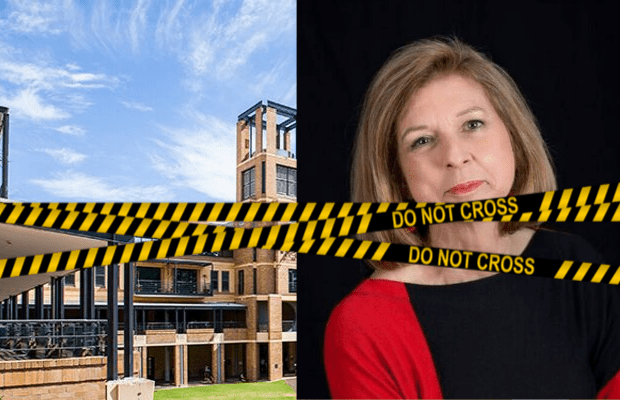Content warning: Sexual assault
Key points:
- Student protesters attempting to protest conservative commentator Bettina Arndt were met by 20 to 30 police and security guards.
- Students were denied access to the event building and were forced to protest outside in a ‘designated protest area.’
- The UNSW Conservative Club had invited Arndt to speak as part of her ‘Fake Rape Crisis’ Tour
A group of students who attempted to protest conservative commentator Bettina Arndt at the University of New South Wales (UNSW) last night were stifled by UNSW Campus Security and members of the NSW Police Force.
Arndt was invited by the UNSW Conservative Club to speak on campus as part of her ‘Fake Rape Crisis’ tour, which sees her arguing that statistics pertaining to high rates of sexual assault on campus are erroneously inflated.
The students were allegedly told by Police that they were not allowed to be in the corridor adjacent to where Arndt was speaking, and that they should retreat to their “designated protest area,” – outside the building.
Arndt acquired video footage of the protesters, which she posted on her Twitter account. “Pity the police refused to allow protesters to join my event for a more lively Q&A but overall a big success,” she commented.
Students participating in the protest informed Honi that they arrived at the foyer and were “immediately met by twenty to thirty police.” The NSW Police force asked protesters to move away from the event entrance on their arrival while simultaneously allowing other students to enter.
When questioned why the students weren’t allowed into the event, “the [security] guards were continuously unable to justify their position. They just kept saying we weren’t allowed in,” they said.
UNSW did not provide comment in response to questions concerning the number of campus security guards deployed to the event, the grounds on which protesters were asked to move away from the event, and whether or not the Conservative Club paid security costs for the event.
A University spokesperson did, however, tell Honi that “The NSW Police Force assessed the requirements for the event and made decisions at the event to ensure public safety.” It is unclear whether the Police appeared at the request of Arndt or the University.
UNSW Women’s Officer, Ruby Leonard-Taylor told Honi that she was advised by End Rape On Campus to hold a counter-protest on a different day, to avoid being filmed by Arndt and her media ensemble, a weapon often used by Arndt. That protest took place last Thursday. As such, the UNSW Women’s Collective did not take part in last night’s action.
Student protesters told Honi “the security guards were antagonistic and there in force with about the same, if not more security guards and police than attendees.”
Increased security presence at UNSW student activist events on campus is not new. This year, the University was forced to apologise for the suppression of student protest by security guards hired by the University during the Cancel Trimesters campaign in June. Over one thousand students were in attendance.
Honi reported that posters were removed from many locations across campus and security guards approached a group of students and staff handing out Cancel Trimester flyers. The guards attempted to prevent protesters from distributing protest material, suggesting they required permission from University management.
In 2018, members of the University of Sydney Wom*ns Collective organised a protest outside Bettina Arndt’s “Fake Rape Crisis” event. Up to 40 protesters were met with police squad which were called during the protest by Arndt herself despite the University charging the Sydney University Liberal Club (SULC) up to $320 in security costs.
Arndt responded to the protest post-event by ridiculing and harassing individual student protesters on social media, subjecting them to “grossly offensive [and] derogatory online comment,” according to Peter McCallum, acting registrar at the time.
Earlier this year UNSW chancellor David Gonski and Vice Chancellor Ian Jacobs stated their view on the importance of Freedom of Speech on University campuses.
“Our fundamental principle is that freedom of speech in the university should be the same as freedom of speech anywhere else in Australia unless there is a very, very, very powerful reason otherwise,” they told The Australian.
Despite the University senior leadership team’s supposed view, protesters told Honi “It was obvious we were being denied entry because we disagreed with Arndt and it was pretty shocking to be censored like this.”





